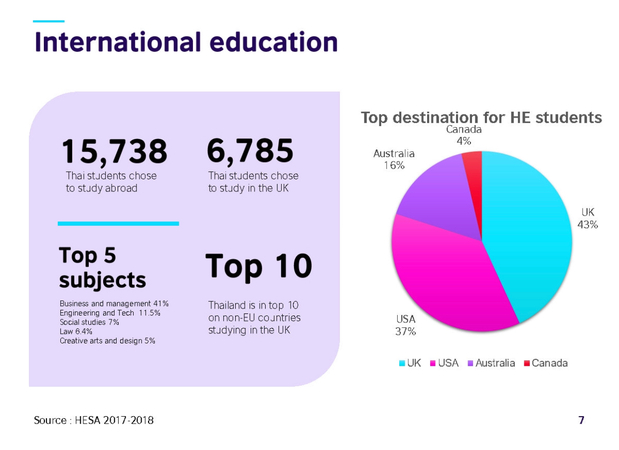UK most popular educational destination for Thai students, says British Council, points out Thai teachers are poor in English

The United Kingdom is the number one destination for Thai higher education students, representing 6,785 or 43 per cent of the total Thai students choosing to study abroad, with the top five subjects being business and management, engineering and technology, social studies, law, and creative arts and design, the British Council said today (February 4).
The United States follows closely behind with 37 per cent, Australia 16 per cent and Canada 4 per cent. The number of postgraduate qualifications obtained the highest reach at 68 per cent, followed by undergraduate at 31 per cent.

The top five subjects Thai students choose to study in the UK are business and management at 41 per cent, engineering and technology 11.5 per cent, social studies 7 per cent, law 6.4 per cent, and creative arts and design 5 per cent, the council added.

“The British Council is an international organisation for cultural relations and educational opportunity,” said director Andrew Glass OBE. “By the end of 2020, two billion people are expected to be using or learning to use English. Our mission in 2020 is stronger than ever. We will continue to bring people together to change the world for the better and deepen relations between the UK and Thailand through our work in English, higher education and science, and creative industries.
“According to the report 'Asean Youth Technology, Skills and the Future of Work' from the World Economic Forum, Asean youth see language skills as one of the most valuable for the future. The challenges we face with English learning in Thailand mainly derive from inequality in education, teaching methodology, and assessment,” he said.
“From our experience, the challenges we face with English in Thailand can be divided into four areas: inequality, insufficient levels of English among teachers, teaching methodology, and testing and assessment. Digital disruption also changes the way people learn English. In 2020, the British Council is providing an end-to-end solution for teaching and testing English to support the needs of students and respond to digital changes.
“We are also introducing a new product for English learners in partnership with Academy Award-winning Aardman animation studios – Learning Time with Timmy – to Thailand. This innovative learning experience includes courses, apps, and a video series to help children aged from four to six learn English through play-based methodology. Using simple words, young learners will develop their English skills in a natural way, building strong fundamental skills in preparation to become global citizens,” Glass added.
The British Council continues to promote UK education through the Study UK Fair and launch of the GREAT scholarships and IELTS prize. Helped by the introduction of the New Graduate Route by the UK government, the UK aims to welcome 600,000 international students globally by 2030.
“There are more than 300,000 people in the crafts sector in Thailand. If we could bridge the skill gaps and change the perception of the craft sector in Thailand, this would not only help to drive the Thai economy but also sustain local wisdom and heritage,” he said.
“The British Council has been working with more than 3,000 crafts entrepreneurs and over 200 brands to enhance their design and social entrepreneurial skills. Building on this success, we will support a growing network of craft communities by strengthening social entrepreneurial skills and promoting the role of hubs and cities through creative economy partnerships,” Glass said.
“Today, the role of the university has changed from lectures in classrooms to becoming the forefront of research and innovation. The government has underlined the importance of collaboration and priorities with BCG; the bio-economy, circular economy, and green economy. There is a strong need for universities to reinvent themselves and reskill the Thai markets amidst the disruption in technology and growing global competition.
“In the last three to four years, the British Council has enabled 55 research collaborations and academic partnerships. The majority of research collaborations are in the areas of medical engineering, biological science, food and agriculture, and energy and engineering. In 2020, we aim to continue to internationalise higher education and science by enabling collaboration between universities and industry, developing research ecosystems and making science more accessible among the public through projects such as FameLab and Researcher Connect,” Glass added.
